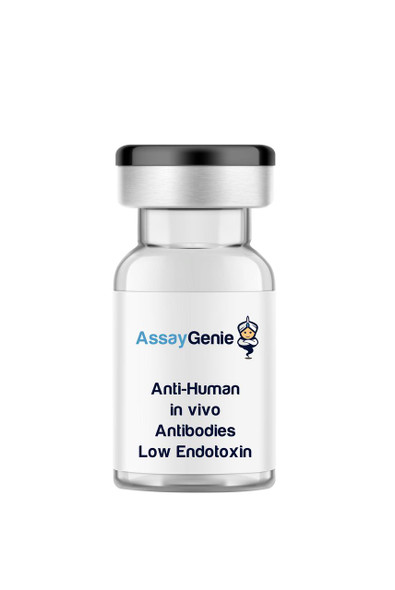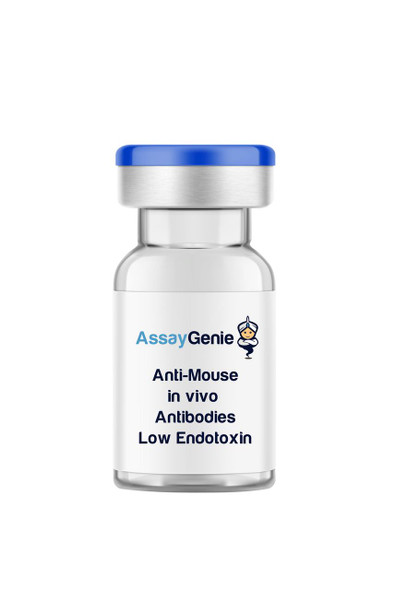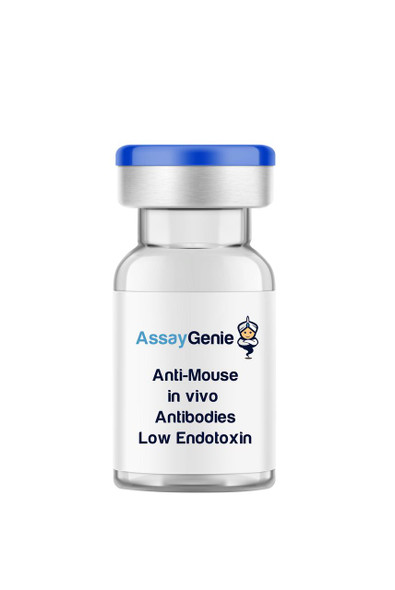Anti-Mouse CD19 In Vivo Antibody - Low Endotoxin
- SKU:
- IVMB0051
- Product Type:
- In Vivo Monoclonal Antibody
- Clone:
- 1D3
- Protein:
- CD19
- Isotype:
- Rat IgG2a kappa
- Reactivity:
- Mouse
- Synonyms:
- B4
- Synonyms:
- CVID3
- Research Area:
- Immune Checkpoint & Cancer Biology
- Research Area:
- B Cell Depletion
- Endotoxin Level:
- Low Endotoxin
- Host Species:
- Rat
- Applications:
- Blocking
- Applications:
- CODEX
- Applications:
- Depletion
- Applications:
- FC
- Applications:
- IHC FF
- Applications:
- IP
- Applications:
- WB
Description
| Product Name: | Anti-Mouse CD19 In Vivo Antibody - Low Endotoxin |
| Product Code: | IVMB0051 |
| Size: | 1mg, 5mg, 25mg, 50mg, 100mg |
| Clone: | 1D3 |
| Protein: | CD19 |
| Product Type: | Monoclonal Antibody |
| Synonyms: | B4, CVID3 |
| Isotype: | Rat IgG2a κ |
| Reactivity: | Mouse |
| Immunogen: | K562 cells expressing the extracellular domain of mouse CD19 |
| Applications: | B, Depletion, FC, IHC FF, IP, PhenoCycler®, WB |
| Formulation: | This monoclonal antibody is aseptically packaged and formulated in 0.01 M phosphate buffered saline (150 mM NaCl) PBS pH 7.2 - 7.4 with no carrier protein, potassium, calcium or preservatives added. |
| Endotoxin Level: | < 1.0 EU/mg as determined by the LAL method |
| Purity: | ≥95% monomer by analytical SEC >95% by SDS Page |
| Preparation: | Functional grade preclinical antibodies are manufactured in an animal free facility using only In vitro protein free cell culture techniques and are purified by a multi-step process including the use of protein A or G to assure extremely low levels of endotoxins, leachable protein A or aggregates. |
| Storage and Handling: | Functional grade preclinical antibodies may be stored sterile as received at 2-8°C for up to one month. For longer term storage, aseptically aliquot in working volumes without diluting and store at -80°C. Avoid Repeated Freeze Thaw Cycles. |
| Applications: | B, CODEX®, Depletion, FC, IHC FF, IP, WB |
| Recommended Usage: | FC The suggested concentration for this 1D3 antibody for staining cells in flow cytometry is ≤ 1 µg per 106 in a volume of 100 µl. Titration of the reagent is recommended for optimal performance for each application. WB The suggested concentration for this 1D3 antibody for use in western blotting is 1-10 µg/ml. |
| Reactivity: | Mouse |
| Host Species: | Rat |
| Specificity: | Clone 1D3 recognizes an epitope on mouse CD19. |
| Antigen Distribution: | CD19 is expressed in the majority of Pro-B cells to mature B cells (during development) and follicular dendritic cells. Plasma cells do not express CD19. |
| Immunogen: | K562 cells expressing the extracellular domain of mouse CD19 |
| Concentration: | ≥ 5.0 mg/ml |
| Endotoxin Level: | < 1.0 EU/mg as determined by the LAL method |
| Purity: | ≥95% monomer by analytical SEC >95% by SDS Page |
| Formulation: | This monoclonal antibody is aseptically packaged and formulated in 0.01 M phosphate buffered saline (150 mM NaCl) PBS pH 7.2 - 7.4 with no carrier protein, potassium, calcium or preservatives added. |
| Preparation: | Functional grade preclinical antibodies are manufactured in an animal free facility using only In vitro protein free cell culture techniques and are purified by a multi-step process including the use of protein A or G to assure extremely low levels of endotoxins, leachable protein A or aggregates. |
| Storage and Handling: | Functional grade preclinical antibodies may be stored sterile as received at 2-8°C for up to one month. For longer term storage, aseptically aliquot in working volumes without diluting and store at -80°C. Avoid Repeated Freeze Thaw Cycles. |
CD19 is a 95 kD transmembrane glycoprotein and member of the Ig superfamily. The antigen serves as an adaptor protein; drawing cytoplasmic signaling proteins to the membrane. It works via the CD19/CD21 complex to decrease the threshold for B cell receptor signaling pathways. Because of its presence on all B cells, CD19 is a biomarker for B lymphocyte development, lymphoma diagnosis and can be utilized as a target for the immunotherapy of lymphoproliferative disorders. Emerging studies indicate that CD19 plays an active role in fueling the growth of these cancers, most notably by stabilizing the concentrations of the MYC oncoprotein, making CD19 an attractive therapeutic target with respect to its downstream signaling.
| Technical Datasheet: | View |
| Protein: | CD19 |
| Function: | Modulates B cell activation and differentiation. |
| Ligand/Receptor: | CD21, CD81, Leu-13. |
| Research Area: | Immunology |
Meet the team!
Shane Costigan
Territory Manager & Team Lead
Abdul Khadim
Sales Executive







